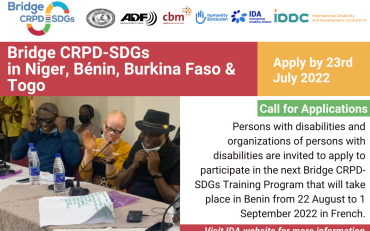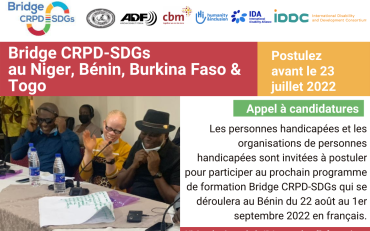Module 1 - 22 August to 1 September 2022
What is the Bridge CRPD-SDGs Training?
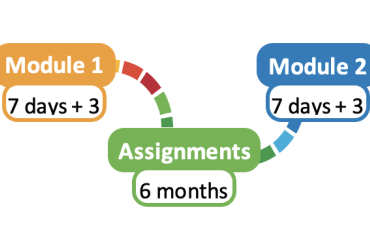
The Bridge CRPD-SDGs is a training initiative developed in 2015 by the International Disability Alliance (IDA) and the International Disability and Development Consortium (IDDC).
This is a two part intensive training focused on an inclusive and comprehensive understanding of the Convention on the Rights of Persons with Disabilities (CRPD) as well as generating a human rights based perspective on development, in general, and the Sustainable Development Goals (SDGs), in particular.
The training consists of two week long residential modules of 7 days each, with an intervening period of six months within which participants undertake to write a policy paper. Participants are expected to take their learnings forward with an organization of persons with disabilities (OPD) that they are linked to.
Since 2015, the Bridge CRPD-SDGs has involved over 1000 people, from 104 countries, with 400 participants from 12 regional and national cycles, that are now part of a lively and active community of practice.
Bridge CRPD-SDGs Niger, Benin, Burkina Faso and Togo
The African Disability Forum, West Africa Federation of the Disabled (WAFOD), the International Disability Alliance (IDA), and Humanity and Inclusion (HI) have the pleasure to launch this open call for participation in the Bridge CRPD-SDGs Niger, Benin, Burkina Faso & Togo.
Language
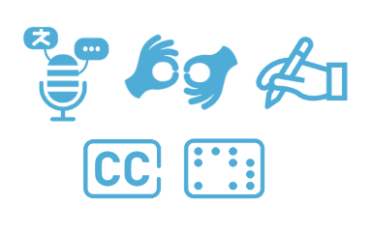
The medium of the training will be French with simultaneous interpretation in the National Sign Languages. Where required, participants will be supported to have materials and access in Braille, alternative script, or augmentative and alternative modes, means and formats of communication that they may be using.
Participants and a focus on underrepresented groups of persons with disabilities
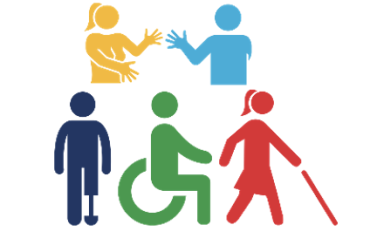
Persons with disabilities from underrepresented groups are strongly encouraged to apply. We welcome applications from all ages, levels of experience, all levels of literacy, and across the diversity of the disability movement, especially from those groups who face high restrictions in participation.
The open selection process for participants is guided by the Bridge CRPD-SDGs Quality Criteria that ensures a balanced group of participants in terms of impairments, gender, urban/rural location, and other identities that may be important to represent in the country or region of the cycle.
Underrepresented groups are those groups of persons with disabilities who remain underrepresented in the disability movement like persons with psychosocial disabilities, intellectual disabilities, deafblind persons, autistic persons as well as indigenous persons with disabilities, persons with disabilities from minority communities, refugee or internally displaced persons with disabilities etc.
Our logistics team works with all selected participants to understand what they need to fully and effectively participate in the training and to enable those reasonable accommodations.
The selection of participants is not negatively influenced by the level of support that they require.
Criteria for application
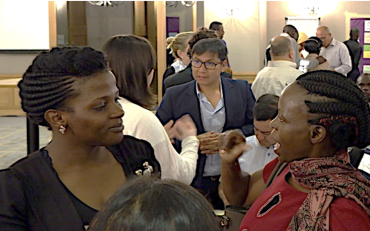
- The Bridge CRPD-SDGs Training is meant to strengthen the OPD movement, therefore, applicants must show linkages to the OPD movement, at any level.
- Candidates should be an active member, staff or volunteer of an OPD or OPD federation which works at the national, sub-regional or continental level.
- The OPD does not need to be a formally registered organization, especially if you are a person with disability from an underrepresented group. It can be a collective, or a network, but it must be led by persons with disabilities and working on rights-based advocacy on the rights of persons with disabilities.
- All candidates must show a commitment to learning, exchange, mentor and support other disability activists within their own group and beyond: be this at a local, national or regional level.
- Even if you work with a single impairment group, you must have a genuine commitment to working inclusively to strengthen a cross-disability movement, being ready to share and learn about the complexity and diversity of the lived experience of disability.
- Preferably, candidates must have a working awareness of the CRPD and a commitment to learn more about how to apply human rights concepts approach, including using other human rights treaties, and the SDGs to advocate for disability inclusive public policy at national and local levels, however, this may be relaxed in the case of persons who have not had access to this exposure on account of the barriers they have faced.
- Candidates must demonstrate experience, interest and aptitude to engage in influencing development processes and public policy, be this at a local, national or regional level,
- Finally, candidates must be able to fully attend both modules and to undertake given assignments. A full missed day disqualifies the participant from completing the Bridge training.
- This will be a fully residential training, and candidates will also have to respect the COVID-19 related protocols that will be in place for the training.
Fees
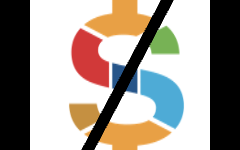
There are no fees payable to the organizers either by participants or their organizations to attend the Bridge CRPD-SDGs Training.
All participants will be asked to sign a letter of commitment, that they will revert the knowledge they receive back to the organization that supported their application.
Application
If you are interested in applying, or are an organization that would like to propose a candidate, the following 3 materials are essential for the application process:
- A statement regarding your interest and commitment to the training and its objectives, reflecting the criteria (above). This can either be written, one page maximum, or via recorded oral or video presentation, including in sign language, not longer than 3 minutes. This can be in French.
- An updated brief CV, preferably not more than 2 pages. Please include your gender, date of birth and if you are a person with a disability, your impairment group.
- Your linkages with the OPD movement must be supported by a letter on the letterhead of an OPD that you are associated with, which could be a sub national, national, regional or international organization of persons with disabilities. Alternatively, if you are working with a collective/network of persons with disabilities that is supported by an IDDC member or a mainstream human rights or humanitarian organization, you can also provide a letter from those organizations to demonstrate your linkages with an upcoming OPD that they are promoting.
All 3 documents must be submitted by e-mail to the following email address: bridge_platform [at] ida-secretariat.org by the end of day July 23 2022.
Find the call for applications in Word and PDF.
___________________________ (French below) ___________________________
Bridge CRPD-SDGs Niger, Bénin, Burkina Faso & Togo
Module 1 - Appel à Candidature - 25 août au 1er septembre 2022
Qu'est-ce que la formation Bridge CRPD-SDGs ?

Le Bridge CRPD-SDGs (en Français, traduite par l’Initiative « Pont CDPH-ODD ») est une initiative de formation développée en 2015 par l'International Disability Alliance (IDA) et l’International Disability and Development Consortium (IDDC).
Il s'agit d'une formation intensive en deux parties axée sur une compréhension inclusive et globale de la Convention relative aux droits des personnes handicapées (CDPH) ainsi que sur la génération d'une perspective basée sur les droits de l'homme sur le développement, en général, et les objectifs de développement durable (ODD) , en particulier.
La formation consiste en des modules résidentiels de deux semaines de 7 jours chacun, avec une période intermédiaire de six mois au cours de laquelle les participants s'engagent à rédiger un document d'orientation. Les participants sont censés poursuivre leurs apprentissages avec une organisation de personnes handicapées (OPD) à laquelle ils sont liés.
Depuis 2015, le Bridge CRPD-SDGs a impliqué plus de 1000 personnes, de 104 pays, avec 400 participants de 12 cycles régionaux et nationaux, qui font désormais partie d'une communauté de pratique vivante et active.
Bridge CRPD-SDGs Niger, Bénin, Burkina Faso et Togo
Le Forum Africain des Personnes Handicapées, la Fédération Ouest Africaine des Personnes Handicapées (WAFOD), l'Alliance Internationale des Personnes Handicapées (IDA) et Humanité et Inclusion (HI) ont le plaisir de lancer cet appel à candidature pour le Bridge CRPD-SDGs Niger, Benin, Burkina Faso & Togo .
Langue

La langue de formation sera le Français avec interprétation simultanée dans les Langues des Signes Nationales si nécessaire, les participants seront soutenus pour avoir du matériel et un accès en braille, en écriture alternative ou en modes, moyens et formats de communication améliorés et alternatifs qu'ils peuvent être utiliser.
Participants et accent mis sur les groupes sous-représentés des personnes handicapées

Les personnes handicapées appartenant à des groupes sous-représentés sont fortement encouragées à postuler . Nous accueillons les candidatures de tous âges, niveaux d'expérience, tous niveaux d'alphabétisation et de toute la diversité du mouvement des personnes handicapées, en particulier des groupes confrontés à des restrictions élevées en matière de participation.
Le processus de sélection ouvert des participants est guidé par les critères de qualité Bridge CRPD-SDGs qui garantissent un groupe équilibré de participants en termes de déficiences, de sexe, de localisation urbaine / rurale et d'autres identités qu'il peut être important de représenter dans le pays ou la région.
Les groupes sous-représentés sont les groupes de personnes handicapées qui restent sous-représentés dans le mouvement des personnes handicapées, comme les personnes souffrant de handicaps psychosociaux, de déficiences intellectuelles, les personnes sourdes-aveugles, les personnes autistes ainsi que les personnes autochtones handicapées, les personnes handicapées des communautés minoritaires, les réfugiés ou les personnes déplacées à l'intérieur de leur propre pays en situation de handicap, etc.
Notre équipe logistique travaille avec tous les participants sélectionnés pour comprendre ce dont ils ont besoin pour participer pleinement et efficacement à la formation et pour permettre des aménagements raisonnables.
La sélection des participants n'est pas influencée négativement par le niveau de soutien dont ils ont besoin.
Critères de candidature

- La formation Bridge CRPD-SDGs est destinée à renforcer les organisations des personnes handicapées (OPH), par conséquent, les candidats doivent montrer des liens avec une OPH, à tous les niveaux.
- Les candidats doivent être un membre actif, un membre du personnel ou un bénévole d'une fédération OPH ou OPH qui travaille au niveau national, sous-régional ou continental.
- L'OPH n'a pas besoin d'être une organisation officiellement enregistrée, surtout si vous êtes une personne handicapée appartenant à un groupe sous-représenté. Il peut s'agir d'un collectif ou d'un réseau, mais il doit être dirigé par des personnes handicapées et travailler sur un plaidoyer fondé sur les droits des personnes handicapées.
- Tous les candidats doivent montrer un engagement à apprendre, échanger, encadrer et soutenir d'autres militants handicapés au sein de leur propre groupe et au-delà : que ce soit au niveau local, national ou régional.
- Même si vous travaillez avec un seul groupe de personnes handicapées, vous devez avoir un véritable engagement à travailler de manière inclusive pour renforcer un mouvement inter-handicap, être prêt à partager et à apprendre sur la complexité et la diversité de l'expérience vécue du handicap.
- De préférence, les candidats doivent avoir une connaissance pratique de la CDPH et un engagement à en savoir plus sur la façon d'appliquer l'approche des concepts des droits de l'homme, y compris l'utilisation d'autres traités sur les droits de l'homme, et les ODD pour plaider en faveur d'une politique publique inclusive du handicap aux niveaux national et local, cependant , celle-ci peut être assouplie pour les personnes qui n'ont pas eu accès à cette exposition en raison des barrières auxquelles elles ont été confrontées.
- Les candidats doivent démontrer leur expérience, leur intérêt et leur aptitude à s'engager à influencer les processus de développement et les politiques publiques, que ce soit au niveau local, national ou régional,
- Enfin, les candidats doivent être en mesure d'assister pleinement aux deux modules et d'entreprendre des missions données. Une journée complète manquée disqualifie le(a) participant(e) pour terminer la formation Bridge.
- Il s'agira d'une formation entièrement résidentielle, et les candidats devront également respecter les protocoles liés au COVID-19 qui seront en place pour la formation.
Frais

Il n'y a pas de frais payables aux organisateurs par les participants ou leurs organisations pour assister à la formation Bridge CRPD-SDGs.
Tous les participants seront invités à signer une lettre d'engagement, qu'ils retourneront les connaissances qu'ils reçoivent à l'organisation qui a soutenu leur candidature.
Application
Si vous êtes intéressé(e) à postuler ou si vous êtes une organisation qui souhaite proposer un candidat, les 3 éléments suivants sont essentiels pour le processus de candidature :
- Une déclaration concernant votre intérêt et votre engagement envers la formation et ses objectifs, reflétant les critères (ci-dessus). Celle-ci peut être soit écrite, une page maximum, soit via une présentation orale ou vidéo enregistrée, y compris en langue des signes, ne dépassant pas 3 minutes. Cela peut être en Français.
- Un bref CV mis à jour , de préférence pas plus de 2 pages. Veuillez inclure votre sexe, votre date de naissance et, si vous êtes une personne handicapée, votre groupe de déficience.
- Vos liens avec le mouvement OPH doivent être appuyés par une lettre sur le papier à en-tête d'un OPH auquel vous êtes associé, qui peut être une organisation sous-nationale, nationale, régionale ou internationale de personnes handicapées. Alternativement, si vous travaillez avec un collectif/réseau de personnes handicapées qui est soutenu par un membre de l'IDDC ou une organisation humanitaire ou de défense des droits de l'homme, vous pouvez également fournir une lettre de ces organisations pour démontrer vos liens avec un prochain OPH dont ils font la promotion.
Les 3 documents doivent être soumis par e-mail à l'adresse e-mail suivante : bridge_platform [at] ida-secretariat.org ( )avant la fin de la journée du 23 juillet 2022.
